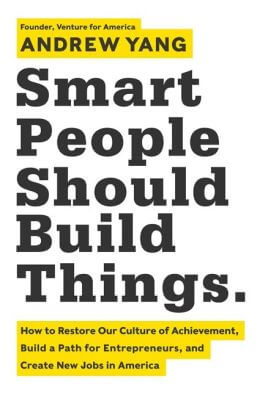Andrew Yang: “Smart People Should Build Things” Excerpt 2
Below is an excerpt from Andrew Yang‘s new book, Smart People Should Build Things: How to Restore Our Culture of Achievement, Build a Path for Entrepreneurs, and Create New Jobs in America, which comes out in February 2014. Andrew was named Managing Director of Manhattan GMAT in 2006, Chief Executive Officer in 2007, and President in 2010. He left Manhattan GMAT in 2010 to start Venture for America, where he now serves as Founder and CEO.
 The Prestige Pathways.
The Prestige Pathways.
Let’s imagine a very large company. It is a leader in its industry and much admired by its peers. It invests a tremendous amount of money—literally billions of dollars a year—in identifying, screening, and training its many employees. Those employees who are considered to have high potential are sent to special training programs at substantial additional cost. Happily, these top training programs are considered to be among the best in the world. After these employees complete their training, the company encourages them to choose for themselves the division in which they’d like to work. Employee preferences are deemed to be the most efficient way of deciding who works where.
This seems like a good system, and it works well for a long time. However, perhaps predictably, many of its most highly rated employees eventually become drawn to the finance and legal divisions because these divisions have very effective recruitment arms, are more visible, pay better, and are thought of as providing a more intellectual level of work. Over time, proportionally fewer of the top recruits go toward the management of the company or the company’s operations. The company’s basic training division is considered a backwater, with low pay and low recognition. And only a relative handful of employees go toward research and development or the launching of any new products.
Take a second to think about the company described above. What do you think will happen to this company as time passes? And if you think that it’s not set on a path to success, what would you do to fix it? This company reflects, in essence, the economy of the United States of America.
If you are a smart college student and you want to become a lawyer and go to law school, what you must do has been well established. You must go to a good school, get good grades (already accomplished, for many), and take the LSAT (a four-hour skill test). There is no anxiety in divining the requirements, as they are clearly spelled out. Most undergrads, even those with little interest in law school, know what it takes to get in. The path location costs are low.
The same is true if you want to become a doctor. Becoming a doctor is hard, right? Sort of. It is arduous and time-consuming, but it is not hard if you have certain academic abilities. You must take a battery of college courses (organic chemistry being the most infamous and rigorous of them) and do well, study for the MCAT (an eight-hour exam), and spend a summer or even a year caddying for a researcher, doctor, or hospital. These are time-consuming hoop-jumping tasks, to be sure, but anyone with a very high level of academic aptitude can complete them.
If you attend an Ivy League university or similar national institution, legions of suit-wearing representatives from the big-name investment banks and consulting firms will show up at your campus and conduct first-round interviews to fill their ranks each year, even in a down period (as with the recent years following the financial crisis). They will spend millions of dollars enlisting interns and educating the market annually. Most freshmen have no idea what management consulting is, yet seniors can rattle off the distinctions of different firms with little difficulty. All undergraduates have friends in the classes above them who have gone through this process and gained analyst or associate positions at major investment banks and consulting firms.
Read more
